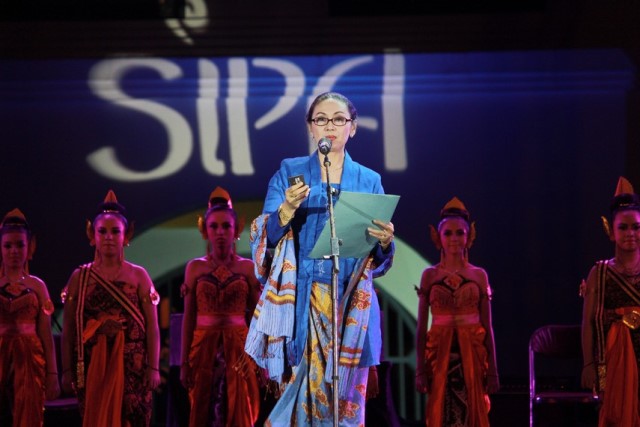
Irawati Kusumorasri and Javanese dance are like two sides of one coin. Kusumorasri’s dedication, love and achievements in Javanese dance and culture have been highly recognized by many groups, both at home and abroad. The name of an artist born in Solo, 1963, has made the name of the region and its nation proud in various cultural missions to foreign countries, such as Japan, France, England, Malaysia, Germany, Russia, Cambodia and the Netherlands.
Having trained herself in the world of motion and dance since she was 5 years old, Ira, as she is affectionately called, learned movement management at Prangwedanan, within the Mangkunegaran palace, with Mrs. Kus and Mrs. Bei Mintoraras. Under the tutelage of the two teachers, the youngest of the couple Sudiyatmo and Sri Wulan mastered various types of classical Javanese dances such as Srimpi Anglir Mendung, Srimpi Moncar, Gambyong, Mondraswara, Mondrokusumo, Mondorini, and Langendriyan.
Growing up, this alumni of the Postgraduate Program of the Indonesian Art Institute has focused all of his attention and energy on preserving and developing his own ancestral culture. In addition to showing flexibility in front of tourists visiting Mangkunegaran Temple, Irawati Kusumorasri’s life is devoted to educating children in the city of Solo and its surroundings as potential heirs to the art of Javanese dance.
Whether he is joking or very serious, Ira once commented that the dance studio he and several other artists are taking care of is the cheapest in Indonesia: Rp. It is clear that this mother of two children firmly believes that it is a sin and a great waste if her dance knowledge and skills stop at the tomb without being able to dance to the next generation.
Among a series of major works by Irawati Kusumorasri that have been held abroad include Oncot Srimpi Topeng Sumunar (1994), Operetta Timun Emas (1996), Obong (1997), Beksan Sekar Ratri Srimpen Kendi Sekar Putri (1999), Bedhaya Kakung “Siguse” (2000), and Sekar Jagad (2002).
His house is wide open to anyone who wants to study and discuss with him. Purbo Asmoro is known by the people around him as a sumeh, easy to get along with, likes any kind of art.
Source: Senipedia.com